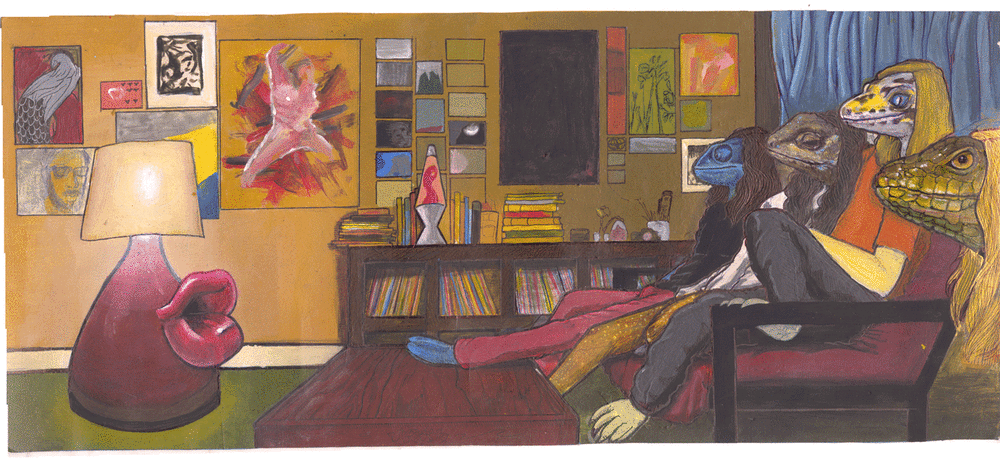© 2014 Nico Pliskin, "Long-Haired Lizards Look at Lips on a Lamp"
The Cost of Welfare Cuts
//Mark Jay
“I wonder at men who dare to feel that they have some paternalistic right to set the timetable for another man’s liberation. Over the past several years, I must say, I have been gravely disappointed with such white ‘moderates.’ I am often inclined to think that they are more of a stumbling block to the Negro’s progress than the White Citizen’s Counciler or the Ku Klux Klanner.”
The 2009 American Recovery and Reinvestment Act, as part of its economic stimulus plan, gave a temporary boost to the Supplemental Nutrition Assistance Program (SNAP). This past November, the boost ended, and for the first time in American history, a Democrat-controlled senate decided to decrease food stamps benefits. As a result, 5.5% of the maximum allotment to the country’s dependents have been made unavailable, or, in starker terms, more than five billion subsidy dollars will become unavailable in 2014 alone. Without the help of the American Recovery Act, SNAP benefits will average less than $1.40 per person, per meal in 2014, down from the paltry $1.50 allotted previously. Seventy-two percent of SNAP dependents are families with children; 91% live below the poverty line; and 55% have incomes less than $11,246, or half of the federal poverty line. As if this reduction is not a big enough slap in the face of the country’s poor, the House Agriculture Committee has approved another $8.6 billion in SNAP reductions, with bipartisan support, untying the food stamps from its historically fraternal twin, farm subsidies.
The cuts have prompted another round of haughty debates in the halls of congress and have caused the shouting heads on both ends of the mass media’s political spectrum to be smug towards each other. Those on the right, figure headed by the likes of Marco Rubio, Rand Paul, and other political disciples of Ayn Rand (“the Nickelback of philosophy”) and spurred on by Fox News, have supported the termination of billions of dollars of benefits, and have even called for further cuts. Their argument for doing so is typically two-pronged: 1) The benefits coddle the poor, many of whom are able bodied and could contribute to society if they had the agency, and 2) Public spending should be redirected towards the private sector, which would be able to create better job opportunities for those willing to pursue them.
Though there was sufficient bipartisan support for the cuts, the predominant response by the Democrats in Congress and their media backers has been to condemn the benefits’ expiration, and their rationalization for doing so is also two-pronged: 1) Our economic recovery is contingent on helping people out of poverty, not plunging more Americans into it, and 2) The way to help America’s poor is to increase aid and increase the minimum wage.
In the Republican and Democratic respective responses to SNAP’s reduction, we see something of a good cop, bad cop routine. The GOP is happy to play the bad cop, beating up on the country’s poor for the good of the market, while Democrats claim they genuinely want to help the poor, and cannot bear to watch them struggle. What seems sadly apparent, though, is that the Democrats are only willing to play the good cop and are not willing to go a step further and turn in their badge.
The GOP has had, and continues to have, a remarkably strong stomach. Republicans say things like, the poor do not deserve our help, they are lazy, they don’t have it so bad - 99% of them even have refrigerators!, food stamps are a form of slavery, there are decent jobs out there for those with the character to pursue them, and they still manage to sleep at night. The Democrats see this conservative attitude towards poverty as repulsive and callous, but, for the most part, they are unwilling to dig at the root causes of such poverty, proposing instead ways to make poverty more tolerable.
© 2014 Jennifer Rowe, "Gulp"
Both parties in Congress today spend a lot of time insulting one another and waxing lyrical about what would be possible if the other party got out of the way. However, through this thin veil of antagonism it is apparent that these parties are codependent. Without one, the other’s existence would be threatened. If the Republicans had their way, this country’s social safety net would soon be dispatched by a corrosive, monopolistic “free market,” and, with millions more plunged into deep poverty as a result, the overwhelming displeasure with the US government would almost certainly boil over into something more antagonistic. On the other hand, without the GOP to blame for the poor person’s condition, the Democratic Party would come face to face with a question: what are they trying to save the poor person from? If not the GOP, then who becomes the big, bad other? In other words, if the poor actually became empowered, what might become of the liberal? For a world without paupers requires no Mother Teresa, and a genuine push towards equality would put an unflattering spotlight on the Democratic leaders’ most glaring characteristic: their privilege, and their unwillingness to countenance a world without it.
Obama and CNN have both embodied the schizophrenic liberal stance on poverty. In public, Obama has made self-righteous calls for a higher minimum wage; in private, he has covertly authorized the Trans-Pacific Partnership, which will further exploit the world’s most vulnerable workers by facilitating relations between transnationals and repressive governments in the Global South. Meanwhile, as CNN intersperses their calls for more aid and a more equitable planet with split-screen segments promoting BP, it is easy to understand the corporate constraints to their analysis.
Each party has an interest in keeping the debate about poverty within confines that are small enough to divert attention from how the two-party system and the corporations that fund each party might be inexorably linked with growing poverty. We see such a narrow discourse unfolding in recent conversations about welfare fraud. The GOP has claimed that welfare fraud is rampant, and that this is a reason to justify the SNAP cuts. The Democratic response has been to deny welfare fraud; even Jon Stewart has spent several segments on his Daily Show poking fun at the Republican obsession with welfare fraud. By vehemently denying welfare fraud, however, liberals tacitly accept the GOP’s basic premise that if welfare fraud were in fact taking place, then this might be a reason to cut benefits.
In interviews with SNAP-dependent residents of the Colony Arms public housing building on the East side of Detroit, I learned that there is, in fact, an extensive underground economy wherein people sell their food stamps for cash. The going rate is 50 cents on the dollar, or after these cuts, just under 90 dollars for a month’s worth of a single person’s SNAP benefits. The residents most likely to sell their food stamps were single mothers, pregnant women and drug addicts. So, as the Republicans argue that welfare fraud is rampant, and the liberals deny it, which party is willing to reflect on the quality of life of someone who is reduced to living off of ninety dollars a month? And if the frame of the debate is simply legal/technical, then how are we to discuss the human effects of SNAP cuts, and how are we to understand the underlying causes of the poverty which led to SNAP-dependence?
As one Colony Arms resident put it:
“There are a few of those who, you can say, get down on the system to keep supporting whatever substance problem they might have. However, you can’t really understand until you take yourself to an apartment and survive off a hundred dollars a month for food — until you come live here, you will never understand the struggle of a person who live in a Detroit rural area. There’s mice running through the hallways ... bed bugs ... people kicking down doors ... you have to be a strong person to deal with that stuff, especially having kids. You have to be a real strong person.”
If we can push the conversation beyond culpability, we will uncover the despair of the growing ranks of Americans who are finding it increasingly difficult to provide for themselves and their families. Echoing what Cornel West wrote 20 years ago in Race Matters, there is a sort of nihilism affecting many of this country’s poorest citizens. The United States, politicians claim, is a meritocratic society. Therefore, the structures - antagonistic police, ineffectual and underfunded schools, a collapsing public transportation system - governing the most marginalized citizens teach them that they are worth less than citizens in wealthier areas.
It is worth taking a moment to consider if any amount of aid to our country’s poorest citizens can make up for the unjust conditions which otherwise surround them. Is the ability to access food a basic human right, or is it a privilege to be doled out if and when politicians decide it’s pertinent?
Unfortunately, as inequality reaches levels that are staggering, the government has eschewed ruminations such as these. Their response to the despair created by entrenched poverty and the waning options for financial and psychological security has been reactionary at best, and lecherous at worst. For example, in addition to the welfare cuts, witness the bankrupt Detroit government, overseeing a city with an unofficial unemployment rate approaching 50 percent, paying the Manhattan Group (funded by the Koch Brothers) more than $600,000 in consulting fees to find ways to incorporate the lucrative NYC Stop and Frisk tactics into the Detroit Police Department.
Several questions follow. In the two-party system, is there any room to view the pregnant mother selling her food stamps for 90 dollars a month as something besides either a) a criminal or b) a figure deserving of pity? Will we continue to view the poor as either worthy or not worthy of our aid? Can government and media elites be made to view poverty as something more than an economic metric, and shift the discourse away from articles like this one in the New York Times, speculating as to the optimal amount of inequality?
As the world becomes increasingly divided between those with more money than they know what to do with and those who don’t have enough for basic necessities, these are questions which probably cannot be ignored for long.
//Mark Jay is a co-founder of The Periphery.



